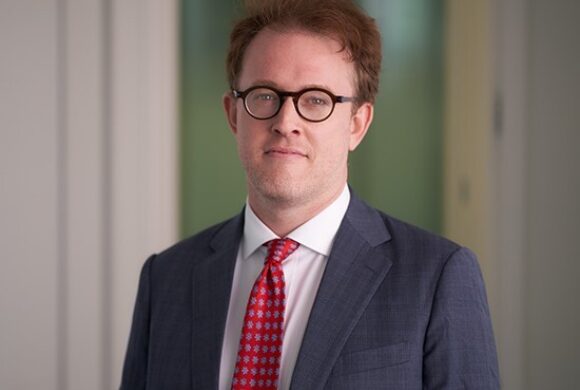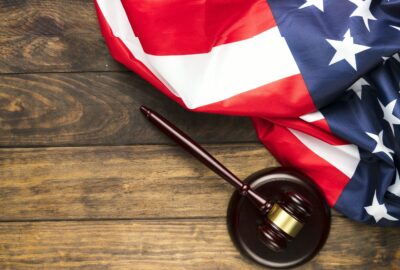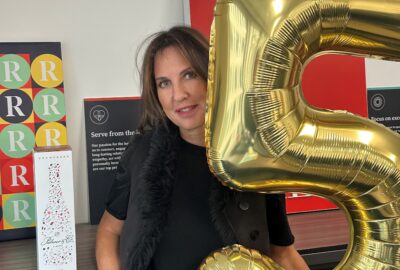
From a life working at The Bar to moving into a firm, this month's Spotlight interviewee, Matthew Brunsdon-Tully, talks to us with great depth and insight about this big move and how his new venture is working out at Wedlake Bell. We also spoke to this Family Partner about the vision for his practice, his proudest professional moment, the biggest change needed in the legal industry and much more. An extremely interesting read I'm sure you will agree.
Matt, you’ve recently joined the Wedlake Bell team in April of this year. What drew you to the firm and what’s been the biggest surprise since joining?
I think I was drawn to the firm due to a winning combination of it being brilliantly led by managing partner Martin Arnold and the board, full service, very nimble and technologically advanced with a really active innovation board as well as IP, tech and data teams, and in the City with modern offices and loads of fantastic space for client meetings, arbitrations and mediations, overlooking St Pauls!
It also seemed like a natural progression. Having been at the Bar I am pretty self-reliant and have my own way of doing things. I was in a lovely and successful team previously but I obviously arrived as a junior partner direct from the Bar. I had a lot of learning to do, a lot of it over the course of Covid. A real baptism. But after a while if you are used to shaping your own practice inevitably to do that you end up needing a little more space than a four-partner team allows. At Wedlake Bell I have a lot of room to bring my own personality to bear and there is a real encouragement to try things and obviously becoming head of team it's a tremendous chance to shape our offerings in a way that is really going to appeal to the current and future family law client.
Also having someone as experienced as Charmaine Hast to work alongside in the practice is also wonderful because she is on the one hand incredibly open-minded and energetic, and on the other she has seen a lot and has bundles of wisdom. The sector is changing quickly and will continue to change.
I am yet to be surprised in the new job but every case that I do and every client I meet surprises me in some way, and actually that is one of the things that keeps us all doing family work.
How has the post-pandemic world impacted on your practice and the way in which your clients’ needs have adapted or perhaps the way in which you service your clients?
More nuptial agreements, more cases where international expertise is necessary as people are just as international as before even if they are maybe moving around a little less, more ADR (I have trained as a mediator with CEDR and continue to do more training to broaden my offering, but I'm also training as an arbitrator this year), more work being done by others such as property search agents, budgeters, experts, online applications and so on, basically less of the old 'churn' work previously done by fee earners. We have to be nimbler and more cost effective to compete. People had a hard time in lockdown so they are keener than ever before to find elegant solutions. Nobody wants to go from lockdown to litigation unless they absolutely cannot avoid it.
There are people out there now with no legal expertise guiding people through their divorces, including kids and finances. They will often refer people to lawyers and work together but that’s not universally true. Inevitably things are going to get missed if they do not (not just in terms of family law but in terms of tax, pensions, and so on) or done in a way that would not withstand scrutiny.
At some point some of those offerings are going to hit issues as people rely on them to give quasi-legal advice and the temptation will be there to give it, but if people rely on that, they are going to get into problems if they get things wrong. But it is still a challenge for lawyers and therefore we must welcome it, because it says a lot about what people want and suggests we are not adapting quickly enough to that. We as family lawyers have to show the value add for people in different ways. Better offerings on fees and more transparency. People understand that we have to make a profit, we are a business, but they want more certainty on fees and more control over the direction of travel in their matters and that is absolutely fine and the right thing.
The HNW world is a bit of a bubble. Yes we cater for that world and I am not going to preach, I act for a couple of billionaires and many more with assets in the millions, that's just part of the job, but I actually think that even the super-wealthy are now more hands on in their own matters or want their personal advisers to have more say.
But my passion is actually trying to find ways to make HNW quality advice available to people who might not get legal advice at all, who might go down one of the other riskier routes, and helping to educate people. More couples are going to want to use just one lawyer to sort things out, that's one innovative way and we have to engage with that. But there are others. That's the challenge for me.
You were a Barrister for over ten years. Why did you decide to make the change and work in a law firm as opposed to a Barrister’s chambers?
Yes, I was a pupil at 1 Hare Court, traditionally the leading divorce and financial remedies (which used to be called ancillary relief when I joined) chambers. I then practised there from 2008 until 2019. I was very lucky to have my grounding there. When I joined Bruce Blair had just handed over to Philip Moor (now Mr Justice Moor) as head of chambers. Nick Mostyn (now Mr Justice Mostyn) was in his pomp. Mike Nicholls was still around doing international children work. These were all leading QCs. I would have been Richard Todd or Nick Cusworth’s last pupil but they both took silk and narrowly avoided having to put up with me! They are both leading silks now. So I was very fortunate. When I arrived Justin Warshaw, my first pupil master, said to me that my main task was going to be helping us prepare for a case called Macleod. That case changed English law on nuptial agreements, and paved the way for prenups to become as important as they are. I ended up fully wigged and gowned in the Privy Council, with Justin, being led by Martin Pointer, against Val Le Grice, who was leading Sam Hillas outside of chambers. Justin and Sam are both leading silks now too. Martin was a brilliant advocate as indeed was Val, much missed. Baroness Hale was within spider’s web distance, as the lead judge on the court. So I was very lucky, I started right at the top of the field, and in some ways I have just been trying to stay there ever since. I was much less involved in Radmacher, but it was great to watch and a couple of my points and references made it into one of the judgments. Val was a big support in chambers. I wish I could repay his early support.
But I always said yes to new work. That catches up with you if you are not careful. I needed to learn to say no, and to take on an amount of work that I could do while maintaining a work-life balance. It is hard to look yourself in the mirror when you are giving advice on family issues when you are not really taking that advice yourself.
Working in a team and having people you can delegate to and brainstorm with, is wonderful. At the Bar you are fending for yourself. Chambers was always a place where you could wander around and ask a question but GDPR slightly changed the open door policy and of course with Covid you have more people working from home.
The Bar can be rewarding and exhilarating but it can also be lonely. I mostly loved the advocacy but not everything that came with it. It took a long time for me to realise that moving across the profession was not 'giving up'. It's no less demanding in many ways, and more demanding in some, but for me it's more manageable. I had to let go of that 'ego' voice in my head which was saying to me, you need to be in a Band 1 chambers to be respected, thrive, and do 'big ticket' litigation. Not so. Once you let go of that and focus on improving yourself and your skill set, for me it's a healthier place to be. Although doing it during Covid was challenging, for me and for lots of people.
I can still do advocacy if I need to and it can be really handy when clients are in a spot. But mostly I’m extremely happy to let former colleagues at the Bar do all that now.
Being at the Bar in big money cases is I think particularly hard right now. There are big demands. And Judges, who only see the highest cost or most bitter cases, they don’t see all the cases that we all sort out quickly and amicably and in fact very cheaply; I feel some are slightly gunning for lawyers at the moment. Ultimately the barristers are in the front line taking the heat even if very little of what may have led to the high costs has had anything to do with them at all. No fun. People have short memories sometimes of when they were in practice. Also the onus is on Judges to case manage effectively and actively, as well as on lawyers, who ultimately have to follow the client’s instructions. Judges don’t see the advice that we are giving behind the scenes, they forget the balancing act between advising and fearlessly representing. The law has changed significantly since I have been in this profession. Once you have sharing, which is absolutely right, you are bound to make everything more expensive as people argue about what is and is not to be shared. The same applies to shared care in children cases to an extent. You are creating expectations and arguments. It is the same as human rights law. Nobody could seriously argue (other than it seems one of the Tory candidates to be our new Prime Minister! Shocker.) that the development of the law in this area is anything other than positive for society. But where you create rights you can’t be surprised that people want them respected and are prepared to litigate about it, sometimes at significant cost. Nothing is without consequence. On one view it’s a sign that the law is having the desired effect. I think some have a tendency to see particular issues, especially high costs, as too isolated. It’s all much more complex. Anyway!
Name the best quality needed for your job?
The ability to understand the human condition, warts and all.
What’s your proudest professional moment?
I remember where I was when I got the offer of pupillage at 1 Hare Court. I was staying in a friend’s penthouse in New York City, where I was interning with a district attorney. For a boy from the Welsh countryside and a very mixed working class and more privileged background it was a bit of a pinch yourself moment. Professionally there have been a few proud moments, probably my first appearance solo as a barrister in the Court of Appeal is the most memorable. The court was packed with members of the public.
If you could change one thing within the legal industry, what would that be and why?
A properly funded justice system would be a good start, including better pay for those in criminal justice in particular. I saw on Twitter the other day that the court in Medway is now sitting at the Holiday Inn. That tells you a lot.
The best piece of advice ever given to you is….
Silence is your friend. I have ADHD and so I don’t always remember to take the advice, but I have never regretted it when I have, at least in court.
The best gift you’ve ever received is….
A little Ford Fiesta when I was 17! If you grow up in the middle of nowhere, then getting a car is your ticket to freedom.
What are you reading / listening to /watching at the moment?
I’m reading Klara and the Sun by Kazuo Ishiguro, listening (like many people!) to the brilliant podcast The Rest is Politics (with Alastair Campbell and Rory Stewart), and I’ve just finished watching Love Life on Netflix, which I LOVED! Beautiful stories wonderfully acted.
What’s your guilty pleasure?
Pot noodles (spicy curry flavour!).


